
In the call center industry, trends are always happening. Call centers are constantly evolving their services to cater to better serve their clients, and the needs of customers are constantly changing. Explore the top call center trends for 2023 that will transform the call center industry.
How is technology changing the way we consume
Technology is changing the way we consume customer service in many ways. First, it is making it easier for customers to get in touch with businesses. This is because businesses are increasingly using chatbots and other artificial intelligence (AI) tools to provide customer service.
Besides that, technology is changing the way businesses deliver customer service. Businesses are now able to use data analytics to understand their customers better and offer them more personalized service.

Technology is making it easier for businesses to manage customer complaints and feedback. With the help of AI, businesses can now respond to customer queries and complaints faster and more effectively.
Furthermore, technology is helping businesses to automate some of the tasks involved in customer service. This includes tasks such as appointment scheduling, payment processing, and others. Call center technology helps businesses to save time and resources while delivering better customer service.
Moreover, technology like internet telephony and VoIP are helping businesses save on costs while delivering better quality customer service. This is because these technologies allow businesses to make use of existing broadband connections to make calls, instead of investing in new infrastructure.
Top call center trends that you expect in 2023
A contact center’s primary concern is finding the person who can assist a customer the most. The crucial term here is “help,” as contact centers are frequently the initial point of contact and can build customer loyalty. These developments in the contact center or call center industry place a strong emphasis on assistance.
The call center industry is constantly changing and evolving. New trends are always emerging that have the potential to transform the way call centers operate. Here are some of the top call center trends that are currently shaping the industry.
Move to the Cloud
Call center solutions are increasingly moving to the cloud. This provides several advantages, including greater flexibility, scalability, and cost-efficiency.
This allows call centers to benefit from lower infrastructure costs and greater flexibility. 95% of enterprises will reportedly be using cloud computing in 2025, which is not surprising. Cloud computing will be at the center of the new digital experience thanks to its astonishingly rapid development in adoption.

The rise of omnichannel support
To provide an excellent customer experience, it is important to be able to support multiple channels (e.g., phone, email, chat).
Call centers are increasingly expected to provide support across multiple channels, such as phone, email, chat, and social media. This trend is driven by the needs of modern customers, who expect a seamless experience regardless of how they contact a company.

A strategy for customer engagement and experience that gives a stronger competitive advantage should be integrated omnichannel. An omnichannel contact center enables agents to seamlessly switch between channels and engagement touchpoints by personalizing each step of the client journey.
A properly implemented omnichannel strategy should include interactions that follow customers from channel to channel, gathering crucial data along the way, as well as smoothly connected channels, completely integrated applications, and intelligent routing.
The use of artificial intelligence
Artificial intelligence (AI) is being used more and more in call centers to automate tasks such as customer service, appointment scheduling, and market research. AI can help call centers improve efficiency and free up agents to handle more complex tasks. There are many behind the scene advantages of AI for call centers.
It has spared call center managers, for example, countless hours spent designing complex call routing algorithms. Businesses may now direct calls to the “best qualified” agent without leaving the customer on hold thanks to AI-based technologies.
Artificial intelligence is being used more and more in call centers to automate tasks and improve efficiency.
“87% of worldwide businesses who adopted AI did so in the hope that technology would offer them an edge over rivals.”
The introduction of AI into communication has also sparked a revolution in terms of improving agents’ productivity, particularly during the pandemic.
AI applications have helped call centers in numerous ways, including by implementing logical call routing and offering multichannel support. AI also assists in providing quick solutions based on information gathered over time and identifies trends that may be solved more easily.
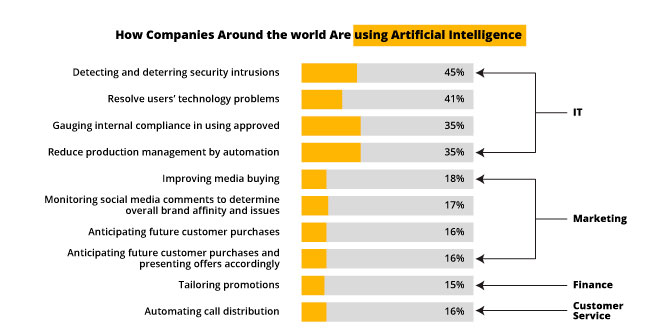
The focus on customer experience
In today’s competitive landscape, call centers are under pressure to deliver an exceptional customer experience. This means providing helpful and knowledgeable support, resolving issues quickly, and making it easy for customers to contact the call center. Companies are changing the way they evaluate consumer pleasure.
They are using an all-in-one approach rather than executing it as a per-channel activity or their technique. Despite the trend’s beginning, we predict considerable advancements in the upcoming years.
It is important to understand a customer’s whole journey to develop an excellent customer experience. It’s important to consider your customer journey map (or if you don’t have one already, construct one). This will assist you in better understanding each interaction you have with your customers.
The need for data security
Call centers handle sensitive customer data daily, so it’s no surprise that data security is a top concern for many businesses. However, call center security can stop issues like data breaches, protect the private information of your customers, and ensure the reputation of your call center.
Moreover, Call center solutions must be able to protect customer data from cyber threats while also complying with data privacy regulations.
Social Media Engagement
Social networking is expanding rapidly. It should come as no surprise that customer experience professionals have emphasized how these platforms are influencing customer service given that over 53% of people on the planet use social media.
For instance, 42% of customers want businesses to respond to their social media concerns within an hour. Additionally, 72% of social media users indicated an increase in their use of social media, which includes interacting with brands and businesses.
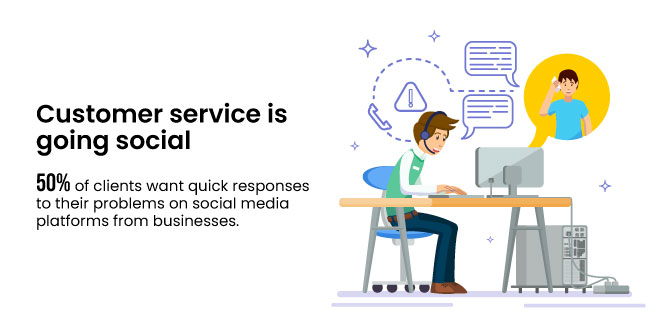
Brands have realized that consumers’ attitudes toward using social media are evolving. Currently, social media is evolving into an integral component of unified communications.
Brands are going all out to improve social media service’s response and efficiency. Two-way social media discussions in particular are dominating the call center service.
This trend is all about providing customer service through social media channels such as Twitter, Facebook, and Instagram. This allows businesses to reach out to a wider audience and provide prompt responses to customers’ queries and complaints A small fault with customer service can escalate into a bigger one with your brand’s reputation if you ignore it.
IVR (Interactive Voice Response)
Interactive Voice Response (IVR) is one of the early developments in call center automation. IVR has been used in call centers for many years, and it appears that the technology has not yet reached its end.
In response to COVID-19, one in three businesses implemented this technology for the first time. In the meantime, many businesses already use IVR boosted its use by 2020.
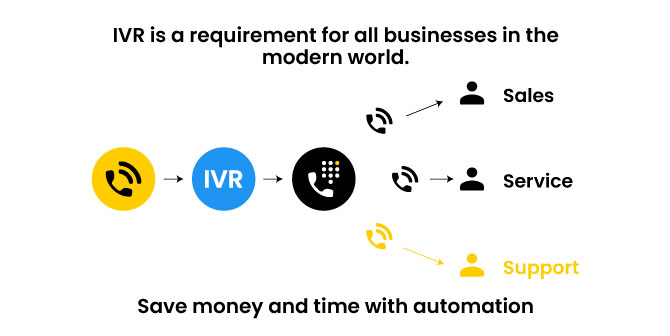
AI’s arrival has given IVR technology new life. The IVR + AI combo has led to the development of advanced IVR systems like conversational IVR, which play more important roles in contemporary call centers.AI developed IVR speech recognition. As a result, call centers can direct callers to the appropriate agents or departments with ease.
Customers will receive assistance from an employee who is best suited to handle their problems in this manner. Additionally, IVR systems using AI retrieve pertinent information and previous data from the customer’s history, enabling agents to provide personalized experiences.
Chatbots
Chatbots are computer programs that can mimic human conversation. They are commonly used to provide customer support on websites and messengers. These days, they are becoming more sophisticated and can handle more complex queries and tasks.
Support is available around the clock without the requirement for agents to be on call. Without having to wait in line for hours or bother a customer service agent at two in the morning, chatbots enable marketers to interact with their audiences all year long and offer prompt responses.
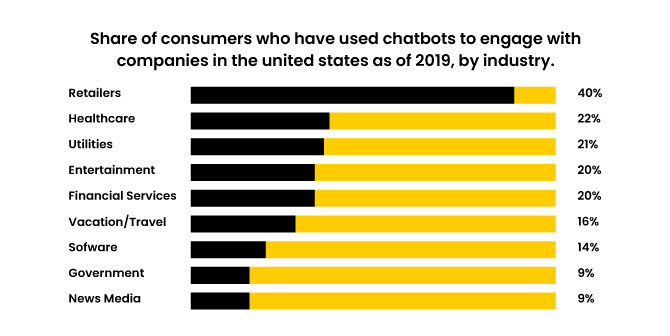
Your AI chatbot can handle routine questions for you. Chatbots keep track of client behavior and can respond to frequently asked queries, assist with recovering abandoned carts, provide support with the checkout process, and more. A chatbot may simply transfer a consumer to a human agent even if it is unable to resolve the issue.
Self-Service Support
Self-service support options such as FAQs, knowledge bases, and online forums allow customers to find answers to their questions without having to contact customer support. This can save businesses time and money while still providing a high level of service.
Customers increasingly prefer self-service options (e.g., online FAQs) over speaking with a live agent. However, call centers must adapt by offering self-service options alongside traditional live support.
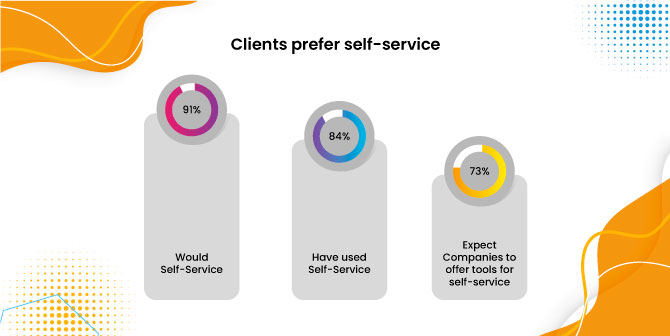
Self-service tools trends
- Self-service tools are preferred by customers over assisted support.
- Today, using self-service platforms is essential to providing outstanding customer service.
- Businesses should work to improve the self-service options now accessible.
- Businesses must prioritize developing more self-service capabilities.
Summing up
The call center industry will see an increase in competition. You should be able to get a sense of how things will turn out from the tendencies we’ve identified. Must figure out how to adapt your company to these developments if you want to succeed in the call center industry in 2023 and the years that follow.
You must adapt to the new call center technology trends, such as AI, IVR, and omnichannel customer support. Moreover, if you haven’t embraced cloud communication, the time is now to do so. Even better, you ought to prioritize the usage of omnichannel communication and cutting-edge self-service solutions.
These trends will lower expenses and streamline the internal process when appropriately implemented. Dialer360 helps you to grow your business with advanced call center software as well as how the solutions fit your call center needs.




